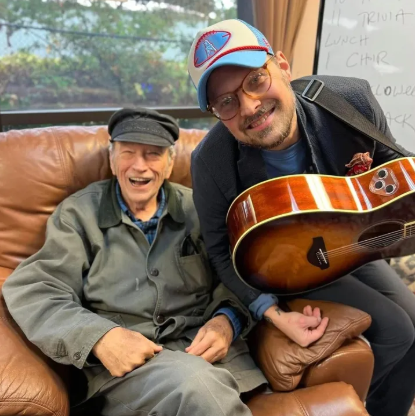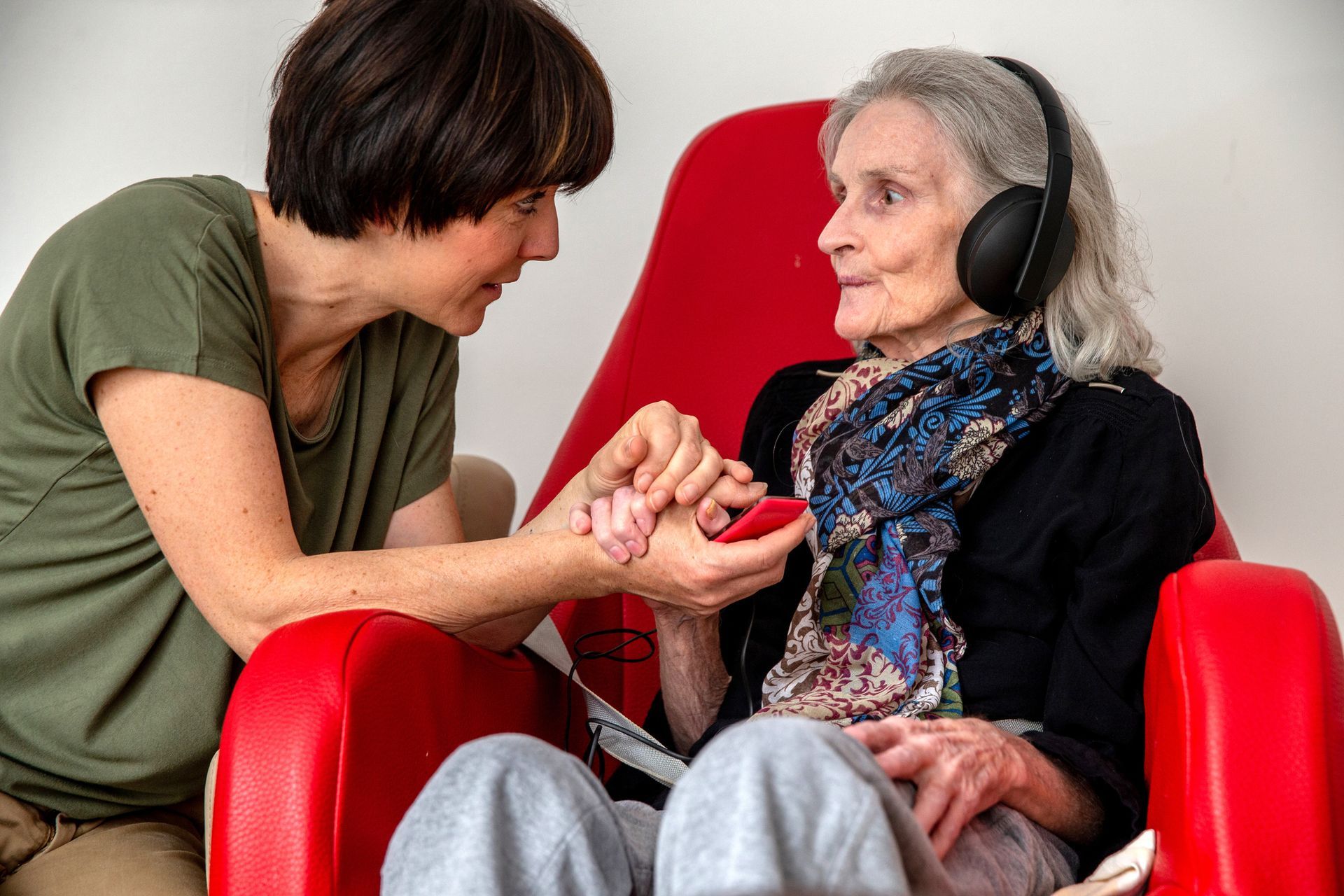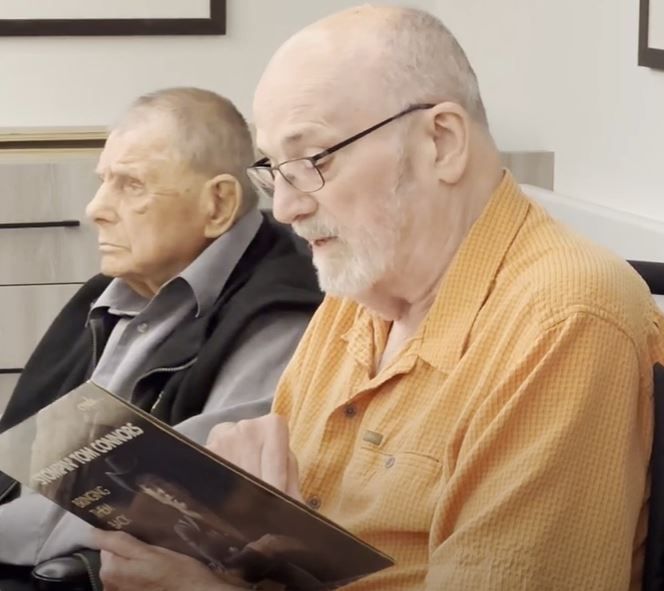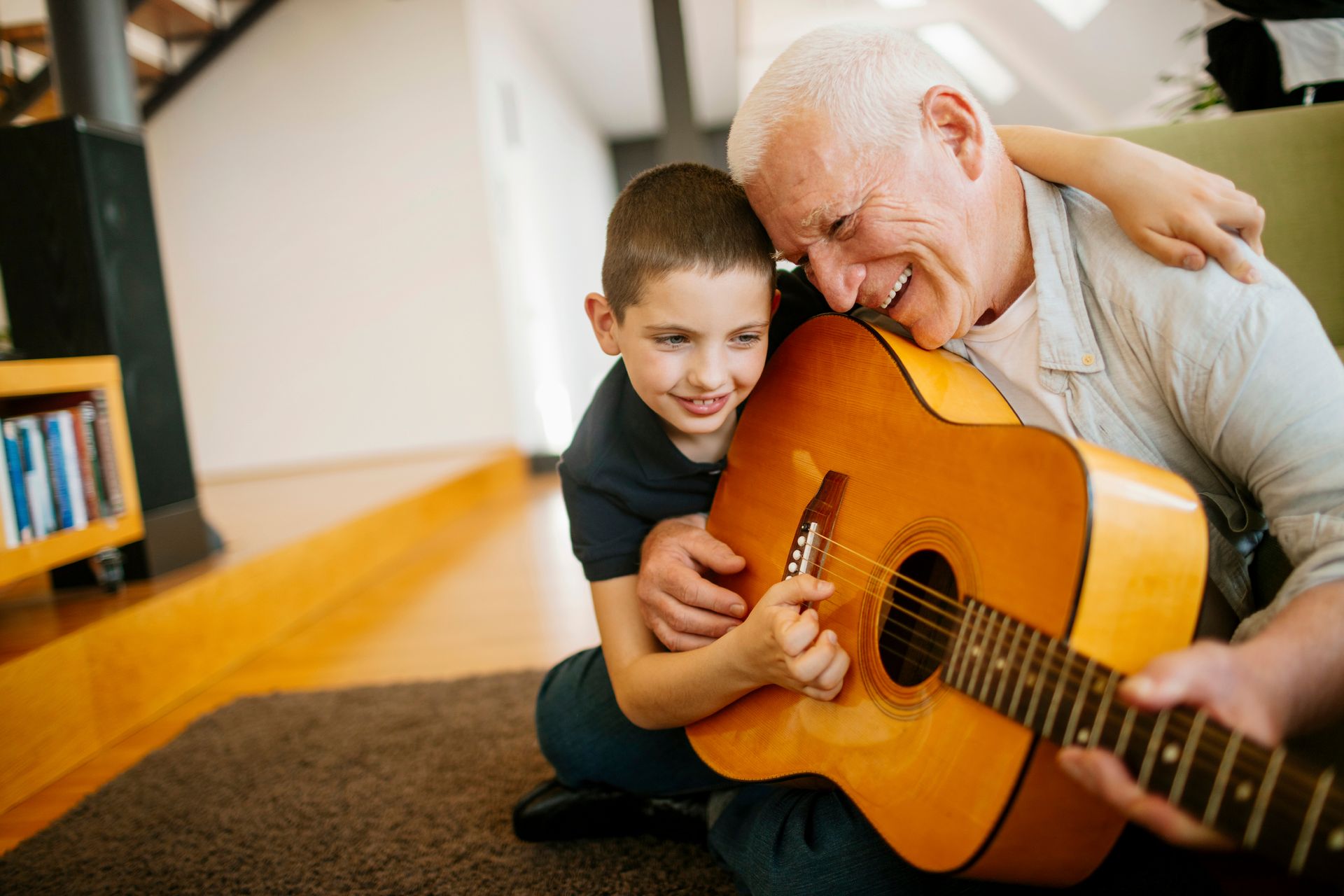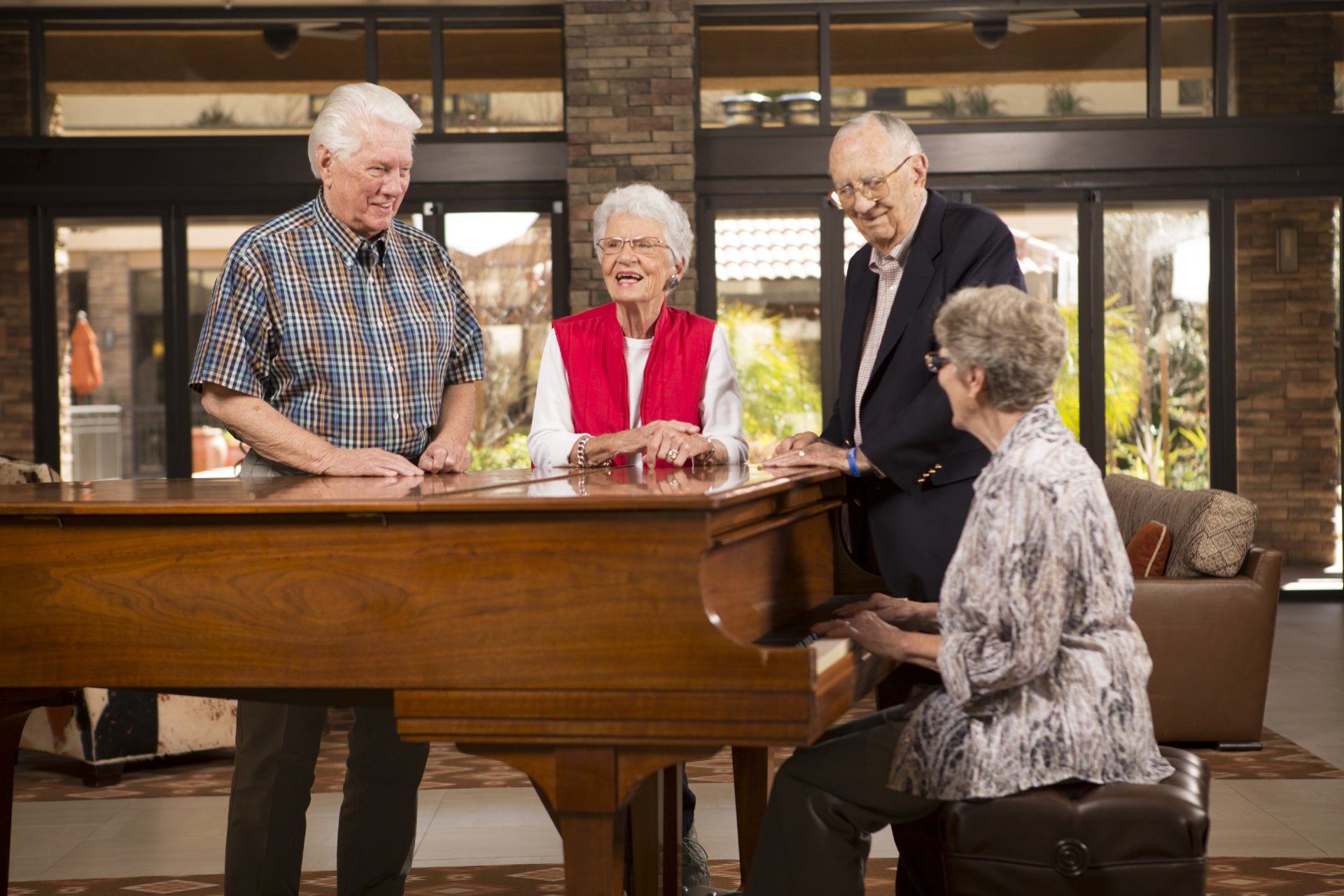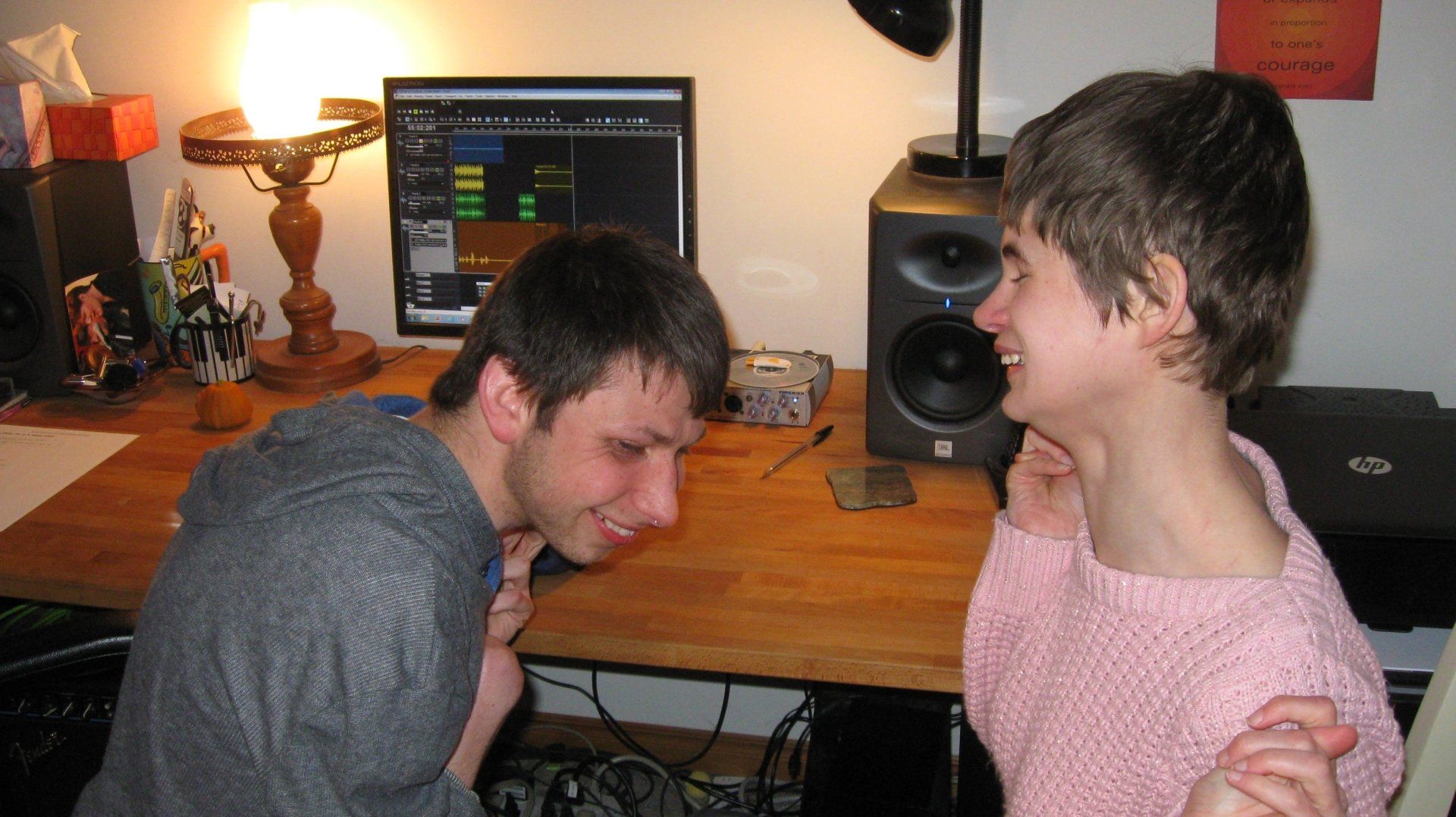Aging
MUSIC CARE WEBINARS
Blogs
By Joseph Konty - MUSIC CARE Certified Individual
•
January 9, 2026
A year goes by, time ticks on, we grow, we further our missions in life. This year was the year of music growth for me as a human. What does it mean to truly care for your fellow human and to use music as a catalyst to care for them? I garnered a lot of ways to do this in a year. What is the main thing I learned? Listening. What truly is the art of listening? I focused heavily on my 10 domains of care. The one I honed in on the most was environmental sound. The environment impacts us all, it’s our scope. The little things count, a movement. It can be a rhapsody, it can be fingernails on a chalk board. I focused on rhapsody and said hello to chalk board screeches. How could I make sounds more pleasant? I adjusted volumes to devices, tones, pitches. I created musical soundscapes that fit the unique quality of the human condition within our realm. I listened with quenches or smiles, I aimed for relieved looks, looks that said, “this sounds right.” I chose sounds that spoke to the tribe. When I worked one on one, I spoke to the spirit of the one. I’m listening to Bob Seger writing this and his song, “Against the Wind.” That’s what I did this year; I ran against the wind. I tackled an inevitable, sounds. Sound should speak to us all, not turn off our volume. I also learned how to help, not only myself cope with unpleasant sounds, but my folks I care for too. The answer? It lies in the acceptance. Call it out- admit it’s way of making you feel. Feel, hear, react, adapt. So, this year as I ran against the wind? The wind began to become a song instead of a gush. It now is more of an orchestra at our facility. Each little hiss, buzz, ring, ding, ting or veritable element of sound is something part of an accepted orchestra. Each or us tuned into our humanness here, in our domain. I also launched our own record label. It’s called Gentog Records, named after our mission. Generations together. We launched our first single to major distributors, it is called, “New Beginnings.” It is music written and inspired by humans dealing with neurodegenerative disorders with me as their Sherpa. It represents a big no to what we call “disease”. It shows that humanity and dignity exist, despite it all; the human spirit is the definition. The label is two-fold. 1) To offer ownership and authorship as creators over their sounds and over their feelings and stories. 2) Generate income for the non-profit we have Gentog Community Services. It’s been a year, one of triumph and failure. Still here we are, perhaps still running against the wind. But, bring on the wind! Embrace its orchestral movement. I know one thing for sure, I’m more in love with sound and humanity. And that, that sounds lovely.
By Bev Foster
•
February 13, 2025
Bono once said, "Music can change the world because it can change people." Many of us have experienced how music can shift our mood, perspective, or even deepen our sense of connection. For some, it’s a song that lifts them from a low point, for others, it might bring them closer to loved ones. In healthcare settings, music can transform not only the atmosphere but also the quality of care itself. I learned this firsthand when, during my father’s final days, my family used music to support him. We sang together to create a sense of calm, even as his medications dulled his awareness. The music allowed us to communicate and connect in a way that words alone could not. It softened the clinical nature of the hospital environment, making it a space of comfort rather than just medical procedure. Those moments had a profound impact on me, shaping my career and commitment to integrating music in healthcare spaces. For over 20 years, I’ve been dedicated to improving care through music as part of the Room 217 Foundation. We work to empower caregivers - whether paid professionals, family members or volunteers - to use music in a way that enhances the care experience. Initially, we created music tools designed to target specific care outcomes. Over time, we expanded to include training for caregivers, helping them incorporate music into everyday practice. Our latest initiative, MUSIC CARE CERTIFY (MCC), goes a step further. MCC is a comprehensive program that integrates music into the organizational culture of health and social care environments. By embedding music as a core component of care, we ensure it is sustained and becomes part of the organization’s long-term operations. One of the most powerful aspects of MCC is its focus on quality improvement. We don’t just introduce music into care settings—we measure its impact. Change isn’t just hoped for; it’s demonstrated and quantified. One standout example is the Alzheimer Society Peel (ASP), the first Canadian organization to receive MUSIC CARE Certification. This community-based organization, which serves individuals with Alzheimer’s and their families, sought to improve its acoustic environment as part of a broader commitment to enhancing care. Through a series of collaborative sound-based interventions, ASP implemented four key sound goals, evaluated through pre- and post-assessments and staff surveys. The results were compelling: Client engagement in activities increased by 75% Client wandering decreased by 40% Staff stress levels were reduced by 50% The success of this initiative underscores the tangible, measurable benefits that music can bring to care settings—improving both the experience for clients and reducing the burden on staff. In this blog series, we’ll delve deeper into Room 217’s MUSIC CARE CERTIFY as a transformative program for health and social care organizations. We’ll explore how music is not a disruptive force, but a framework for meaningful, sustainable change. With case studies from a variety of care settings across Canada, we’ll showcase how embedding music in care culture improves quality of life for all involved. Imagine a care environment where music is always accessible, integrated, and sustained! This is the future we’re working toward. Music isn’t just an art form; it’s a catalyst for measurable change in health and wellbeing. Care leaders have the power to make that change a reality within their organization. Over the next few months, our Key Change blog series will explore how the transformative power of music can improve the care experience and create lasting impact across Canada’s health and social systems. Want to learn more about MUSIC CARE CERTIFY? Come to our free, online, 45-minute Discovery session on Wednesday February 26 – 2 pm EDT. Contact Tanya for more information talbis@room217.ca
By Gillian Wortley
•
September 13, 2024
A growing concern among both recreational and clinical staff in long-term care (LTC) is the health and wellness of men in care. Health professionals have long recognized that men, both in and out of care, tend to experience lower overall health profiles compared to women. RESEARCH widely acknowledges that sex and gender intersect with factors like race, ethnicity, socioeconomic status, disability, and age to shape individual health outcomes. Notably, men face unique challenges when it comes to health and wellness. Globally, men are outlived by women in all settings, a phenomenon known as the male– –female health-survival paradox The Male-Female Health-Mortality Paradox | SpringerLink . This disparity highlights the need for gender-specific approaches to healthcare, as men’s health is increasingly recognized as a public health concern. Researchers and policymakers are working to understand the roots of these inequalities, with many pointing to social norms and behaviors formed in adolescence. We are familiar with stereotypes about men engaging in higher-risk activities, from motorcycle riding to nicotine addiction. However, one of the most significant factors affecting men’s health and longevity is their tendency to have fewer and less robust social connections compared to women. Women generally participate in social forums where they express emotions more freely, while men, historically, have been less likely to depend on social groups or engage in regular emotional expression. This can lead to isolation, which negatively impacts both mental and physical health. One promising approach to addressing social isolation among men is through men’s musicking. Music has always provided a way for men to come together—whether through singing, playing instruments, or participating in music listening groups. From male choirs like the Maesteg Choir in Scotland, to garage bands playing for the sheer joy of it, music offers a safe, non-threatening environment for men to gather, share memories, and express emotions, even if only subtly. Our September webinar presenter and partner, Gertrude Letourneau, shared a powerful story from her work in a long-term care home. One resident, a veteran, asked for permission to sing in his home language, which happened to be German. Being deeply sensitive to the other veterans he lived with, he began to sing which prompted an incredible emotional release of grief, tears, regret, reflection and sorrow. Menno Place, a recent graduate of our CERTIFY for ORGANIZATION program, discovered through their own research that hosting a vinyl record listening hour provided a powerful way to engage self-isolating men. This nostalgic activity brought men out of their rooms and into a safe, non-judgmental space where they could share memories, relive the joy of past entertainers, and reflect on times gone by. The program bridged generational gaps, allowing them to swap stories with the younger caregivers. Linda Weatherly, Manager of Therapeutic Recreation and Volunteer Services at Menno Place in Abbotsford, British Columbia, recalled that some conversations became quite lively, even veering into “racy” territory at times. However, this openness was precisely what was needed—creating a space where the men felt comfortable being themselves and expressing what they needed to. The program, known as Men’s Musicking, became much more than a listening hour. It was a catalyst for cognitive stimulation, sparking memories and conversations that promoted social interaction and emotional expression. The long-term effects of this initiative remain to be seen, but for now, we can applaud the creative and innovative leadership of people like Linda, who are using music to address some of the most pressing concerns in healthcare today.
By Kaityn Aquino
•
January 26, 2023
Did you know singing can improve voice quality? As we age, it can become more effortful to execute the act of speaking. Older adults experience something called presbylaryngis , which is the hardening of the vocal folds. Singing can help older adults maintain important elements of vocal control, as well as create meaningful opportunities for interaction. Here are five reasons why you should sing with older adults. 1. Singing can increase breath support As we age, our abdominal muscles become weakened due to lack of use which contributes to difficulties coordinating the act of speaking. By triggering our reflexive breathing response, we can address decreased breath support. For example, when you breathe out, you must breathe in. It can also be helpful to make lyric sheets that indicate where to breathe! The next time you’re singing, try adding a reflexive breath and see if you feel a difference. 2. Singing can increase vocal volume One common symptom of presbylaryngis is decreased volume, especially towards the ends of phrases. By singing with older adults and crescendoing (getting louder) through a phrase, you can target decreased volume. It can be helpful to make lyric sheets that show the lyrics getting larger to indicate to sing louder. You can also add hand movements, like a pulling motion, to help with singing louder. The next time you’re singing, experiment with this and see if you can hear a difference! 3. Singing can increase range Another common symptom of presbylaryngis is a higher pitched voice. The smaller our range, the less expressive we can be with our speaking voices. This is called inflection. Inflection is when we change the tone or pitch of our voice when we are speaking in order to convey a more precise meaning for our words or provide insight about how we are feeling. It can be helpful to sing familiar songs in different keys. You might find that some keys feel more comfortable to sing depending on the range of your voice. 4. Singing can reduce speaking effort Symptoms of presbylaryngis and weakened abdominal muscles can result in effortful speaking and vocal fatigue. Through singing tasks that focus on the different elements of vocal control, we can counterbalance the vocal load. With speaking, the use it or lose it principle applies. The more we engage in the task, the easier it will be to do. By singing regularly we can support healthy speaking and singing voices, and communicate more easily with friends and family. 5. Singing improves emotional wellbeing Group singing can reduce feelings of isolation and loneliness, as well as provide opportunities for meaningful connection by reminiscing about the positive memories that make us feel better. Singing with others can also make us feel more confident in our speaking and singing voices. Sometimes, all we need to do is sing.
By Louise Campbell
•
November 29, 2022
When the Participatory Creative Music Hub put out an Open Call for projects with a focus on Health, we never guessed that so many of the projects would center around creative expression through the voice! From singing and song-writing to DJ-ing, poetry and rap, the projects demonstrate the incredible range of ways in which the voice can be used to support participants’ health and well-being. For example, Haida Elder Jiixa (Gladys Vandal) and settler Julia Weder team up in Preserving Language Through Music & Film to share language and creativity through rap music videos. As Julia writes, this project “was intended to support Jiixa in her own language-sharing and creative visions, as she is hugely motivated to share the language now that she is diagnosed with ALS and has limited mobility”. Watch and listen to the music video ‘X̲anjuudal Travelling to Vancouver’ in which we not only see and hear the transmission of language, but also the connection and ready laughter shared by Jiixa and Julia. In another use of voice, Laura Gillis’ Vintage Voices features members of a long-term care centre who DJ a radio show based on the Participatory Creative Music Hub put out an Open Call for projects with a focus on Health, we never guessed that so many of the projects would center around creative expression through the voice! From singing and song-writing to DJ-ing, poetry and rap, the projects demonstrate the incredible range of ways in which the voice can be used to support participants’ health and well-being. For example, Haida Elder Jiixa (Gladys Vandal) and settler Julia Weder team up in Preserving Language Through Music & Film to share language and creativity through rap music videos. As Julia writes, this project “was intended to support Jiixa in her own language-sharing and creative visions, as she is hugely motivated to share the language now that she is diagnosed with ALS and has limited mobility”. Watch and listen to the music video ‘X̲anjuudal Travelling to Vancouver’ in which we not only see and hear the transmission of language, but also the connection and ready laughter shared by Jiixa and Julia. In another use of voice, Laura Gillis’ Vinta the music of their choice. The purpose of the project is to provide a DJ with a platform to share the music they love and their thoughts on this music, and as Laura writes, “bring these voices to the rest of society via short radio clips’. Laura writes, “In my work in Long Term Care, I witness the negative effects of our society’s ageism and ableism: Individuals living in Long Term Care, families, and healthcare providers often struggle to have a voice, to be noticed, valued, and to receive the support and recognition that is needed. The tone of Vintage Voices is light and fun, however it serves to amplify seldom-heard voices and to put a face (or rather a voice!) to individuals living in these settings, allowing them to show the value of life at every stage.” Go to Vintage Voices to listen to three DJs’ radio clips. Using a poem written by a participant, Naila Kuhlmann’s Piece of Mind: Understanding And Comunicating Parkinson’s Disease Through Music And Poetry , features a collaboration with poet Lili Saint-Laurent, a woman living with Parkinson’s Disease (PD), and musician Caroline Barbier de Ruelle. Lili’s poem Sur le fil (On a wire) is an expression of her day-to-day experience of PD, and served as the starting point for a creative process between Lili and Caroline. See this video for a description of the process used, the thoughts of the participants, excerpts of the creative process and the resulting circus piece that features Lili speaking her poem. For those participants who express themselves readily through non-language based vocal expression, Geremia Lodi’s Silent Rhythms features participants who create silent ‘movement phrases’ that are then interpreted vocally. See this video tutorial for a demonstration of the process used to create both movement and it’s interpretation in sound. Multiple projects focused on collaborative songwriting. For read more about the processes used, and listen to the music, see: Sound & Song: Collaborative Songwriting With Seniors & Elders Music Takes You Higher: Collaborative Song-Writing With People Living With Dementia Let’s Re-Imagine: Challenging The Stigma Of Dementia Through Collaborative Song-Writing There clearly many ways of supporting health and well-being through the voice. If you have more to share, consider submitting to the PCM Hub! See HERE to create and account and submit, and reach out to Louise Campbell at mlouisecampbell@gmail.com for more information.
By Dawn Ellis-Mobbs
•
August 5, 2022
The impact of COVID in care settings, specifically Long-Term Care, has been monumental with social programming being set aside for safety protocols and PPE. Although the movement to a more medical model of care makes sense from a safety lens, we are now realizing the devastating effect this has had on residents as they express helplessness, loneliness, isolation, and boredom. In December 2021, Patient Ombudsman, Craig Thompson, was interviewed about the recent report entitled “Honouring Voices and Experiences, Long-Term Care Home Survey” where he suggests hiring more Recreation Therapists to offset the impact of restrictions. Elaine, an 85-year-old woman with dementia was quoted as saying ‘I just wish someone would dance with me.’ She acknowledges that her physical needs were taken care of as she was clothed and fed, but her greatest desire was for someone to stop and dance with her. The music care approach has been taught for over 16 years by Room 217. Our Level 2 Music Care Training talks about the 5 human domains being spiritual, cognitive, emotional, physical, and biological and how music works to meet needs in all areas. Recreation Therapists are trained to understand mental, physical, psychological, social, and spiritual domains of residents and develop programs providing care based on the needs of residents. When music is used by Recreation Therapists, the outcome is better quality of life for all, staff included. Our upcoming Masterclass is open to anyone with Level 2 or 3 Music Care Training, and all LEARN and CERTIFY members. On August 18th, we will be hosting a Dance Therapist and Teacher, Katherine Mandolidis of Ballet Edmonton who will walk us through a series of music and movement that can be added as an everyday wellness routine or break. Join us for music, movement and conversation and let’s bring some light back into the lives of those that need the music most. In the meantime, let’s all seek inspiration from the viral video of Marta Cinta Gonzalez, a former ballet dancer living with Alzheimer’s, come to life when she hears the music of Swan Lake. Watch video Link to report noted in blog: https://www.trontario.org/files/Advocacy/TRO-LTC-Commission-Submission-Nov-2020.pdf
By Julia Cara
•
March 29, 2022
This article was written by Julia Cara, and is part of a series provided by upper year Health Sciences students at McMaster University.
By Deb Bartlett
•
January 30, 2020
One of Room 217 ’s four pillars is education and training . Through the years, the Foundation has facilitated sharing information about using music in care in a number of ways; the annual Music Care Conference ; our Music Care Training ; Music Care Webinars ; and now through the Virtual Learning Studio . We know that people have different learning styles, interests, budgets and time restraints. One thing we hear frequently as we meet with stakeholder groups across the country is that attending training from a rural or remote area is a big problem when it comes to accessing continuing education and that’s part of the reason we launched the Virtual Learning Studio. We wanted to make learning accessible to everyone.
By Various Writers
•
December 9, 2019
This is the third in a series of articles that examine the impact Music Care Training has in care settings and contexts. Watch for monthly stories from Level 3 graduates. This week’s blog post is written by Alison Dale, who works as a director/musician/writer. She operates Soul Fire Express: Music Care and Communication in Stratford, ON.
By Deb Bartlett
•
September 16, 2019
We know people are busy, and there are limited dollars for professional development. That’s why Room 217 hold a one-day only conference and packs it with content to educate, stories to inspire, and music to entertain.
Show More
Articles
Alain, C. et al, (2019). Music and Visual Art Training Modulate Brain Activity in Older Adults.
Frontiers in Neuroscience, 13, 182. https://doi.org/10.3389/fnins.2019.00182
Bonavolontà, V. et al, (2021). Effects of Ballroom Dance on Physical Fitness and Reaction Time in Experienced Middle-Aged Adults of Both Genders.
International Journal of Environmental Research and Public Health, 18(4), 2036. https://doi.org/10.3390/ijerph18042036
Brault, A., & Vaillancourt, G. (2022). Group Telehealth Music Therapy With Caregivers: A Qualitative Inquiry.
Journal of Patient Experience, 9. https://doi.org/10.1177/23743735221107241
Creech, A. (2019). Using Music Technology Creatively to Enrich Later-Life: A Literature Review.
Frontiers in Psychology, 10, 117. https://doi.org/10.3389/fpsyg.2019.00117
Hallam, S. et al, (2014). Does active engagement in community music support the well-being of older people?
Arts and Health, 6(2), 101-116. DOI:10.1080/17533015.2013.809369
Hays, T. & Minichiello, V. (2005). The meaning of music in the lives of older people: A qualitative study.
Psychology of Music, 33(4), 437-451. https://doi.org/10.1177/0305735605056160
Koelsch, S. (2013). From social contact to social cohesion: The 7 cs. Music and Medicine, 5(4), 204-209. https://doi.org/10.1177/1943862113508588
Mattle, M. et al, (2020). Association of Dance-Based Mind-Motor Activities With Falls and Physical Function Among Healthy Older Adults: A Systematic Review and Meta-analysis. JAMA Network Open, 3(9), e2017688. https://doi.org/10.1001/jamanetworkopen.2020.17688
Parbery-Clark, A. et al, (2011). Musical Experience and the Aging Auditory System: Implications for Cognitive Abilities and Hearing Speech in Noise.
PLoS ONE, 6(5), e18082. https://doi.org/10.1371/journal.pone.0018082
Pentikäinen, E. et al, (2021). Beneficial effects of choir singing on cognition and well-being of older adults: Evidence from a cross-sectional study.
PLOS ONE, 16(2), e0245666. https://doi.org/10.1371/journal.pone.0245666
Van Malderen, L., Mets, T., & Gorus, E. (2013). Interventions to enhance the Quality of Life of older people in residential long-term care: A systematic review.
Ageing Research Reviews, 12(1), 141–150. https://doi.org/10.1016/j.arr.2012.03.007
Vincenzi, M. et al, (2022). Music Listening, Emotion, and Cognition in Older Adults.
Brain Sciences, 12(11), 1567. https://doi.org/10.3390/brainsci12111567
Wang, C., et al, (2021). Effects of music intervention on sleep quality of older adults: A systematic review and meta-analysis.
Complementary Therapies in Medicine, 59, 102719. https://doi.org/10.1016/j.ctim.2021.102719
Yanguas, J., Pinazo-Henandis, S., & Tarazona-Santabalbina, F. J. (2018). The complexity of loneliness. Acta Biomedica, 89(2), 302–314. https://doi.org/10.23750/abm.v89i2.7404
Books
Clair, A. (1996). Therapeutic uses of music with older adults. Baltimore, MD: Health Professions Press Inc.
Lathom-Radocy, W. (2002). Pediatric music therapy. Springfield, IL: Charles C. Thomas Publisher Ltd.
Meredith, V. (2007). Sing better as you age: A comprehensive guide for adult choral singers. Santa Barbara, CA: Santa Barbara Music Publishing, Inc.
Mindlin, G., Durousseau, D., & Cardillo, J. (2012). Your playlist can change your life: 10 proven ways your favourite music can revolutionize your health, memory, organization, alertness, and more. Naperville, IL: Sourcebooks, Inc.
Robb, S. (Eds.). (2003). Music therapy in pediatric healthcare. research and evidence-based practice. Silver Spring, MD: The American Music Therapy Association Inc.
Links
